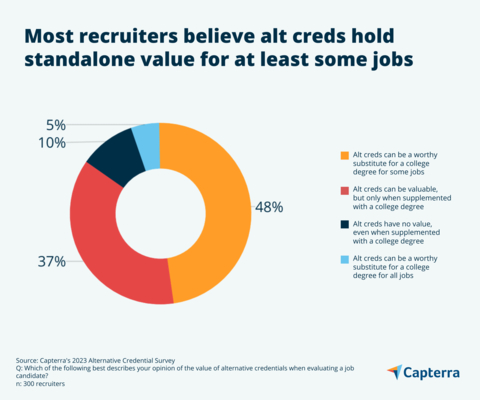As college degrees become more expensive and post-grad salaries stagnate, job seekers are turning to more affordable options such as coding bootcamps and certification programs. According to Capterra’s 2023 Alternative Credentials survey of 300 recruiters, 96% of them say they’ve had at least one applicant submit a resume with an alternative credential in the past year.
This press release features multimedia. View the full release here: https://www.businesswire.com/news/home/20230720298505/en/

According to Capterra’s survey, recruiters find value in alternative credentials for at least some jobs. (Graphic: Business Wire)
The report reveals that 41% of employers have already removed college degree requirements from job openings in the past year. When asked to give all the reasons they’re removing degree requirements, 74% of recruiters say it’s to make their hiring process more equitable and 53% say they’ve had success hiring good employees who don’t have college degrees.
“As job seekers shift their education budget to more affordable alternative credentials, it’s an encouraging sign that employers are adapting,” says Brian Westfall, principal HR analyst at Capterra. “Dropping inequitable college degree requirements on job openings and recognizing the value certificates, digital badges, or other alternative credentials can bring to an organization are a great start.”
As a result, employers are increasingly recognizing the standalone value of alternative credentials. Nearly half (48%) of recruiters believe that alternative credentials can be a worthy substitute for a college degree for certain roles. Specific roles such as IT, sales, and customer service prioritize professional certifications as the most valuable credentials. Reputation and amount of instructor-led teaching are the top factors recruiters use when assessing alternative credential quality.
However, as the demand for alternative credentials surges, recruiters also face a significant challenge in validating their authenticity and relevance for specific jobs. A significant 43% of recruiters say they sometimes or always don’t recognize an alternative credit when it appears on a resume, and 71% agree that evaluating the quality of alternative credentials is harder than assessing a college degree.
“Recruiters have to start improving alternative credential verification now,” says Westfall. “Resume fraud is already a major problem, so if recruiters don’t find a way to get a better handle on the influx of alternative credentials, the risk of hiring someone with a bad or fake credential that lacks the skills and knowledge to do their job is high.”
Compared to 86% of recruiters that contact colleges directly or ask the applicant to submit a copy of their college degree for verification, only 76% do the same for alternative credentials. With 77% of recruiters expecting to receive more applications with alternative credentials in the years to come, now is the time to develop a set process for vetting candidates.
The full report provides recommendations to help recruiters vet alternative credentials, including establishing a dedicated field for alternative credentials on applications, collaborating closely with hiring managers, and establishing criteria to differentiate good credentials from bad ones.
To research tools and discover more resources to help make the right hiring decisions, visit Capterra.com.
About Capterra
Capterra is the #1 destination for organizations to find the right software and services. Our marketplace spans 100,000+ solutions across 900 categories, and offers access to over 2 million verified reviews—helping organizations save time, increase productivity and accelerate their growth.
View source version on businesswire.com: https://www.businesswire.com/news/home/20230720298505/en/